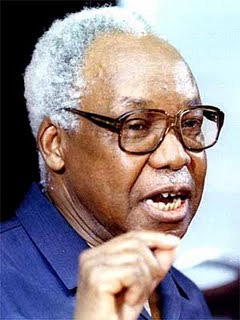This article was published in The Citizen Newspaper, Tanzania on October 29, 2024.
Shimbo Pastory
In most, if not all, African countries, the struggles of nation building by the native citizens after independences were built on certain wholistic philosophical thoughts wrapping integrally all aspects of the lives of these newly set free citizens.
These philosophies were much broader than the popular nuggets we have in certain famous quotes, telling us of the ideas behind the certain actions, and visions behind implementations of those plans. These philosophies live beyond their history.
For example, Mwalimu Nyerere first developed an all-encompassing philosophical thought, which was intended to be a backdrop for the nation he (and they) intended to build. We can find in his philosophy, ideas of education, culture, empowerment, emancipation, etc. all of which are built to hold onto the centre, which is the core of the free and fundamentally communitarian human person. His philosophy is summed in one deep Kiswahili concept: ‘Ujamaa.’
Many other African nations progressed as manifestations of certain philosophies of their leaders, a result of which is the diversity we have in the continent today. Having a philosophy is of course not a guarantee of perfection or success, hence the disparities that exist; but it is indicative of a foreseen future.
It is important to have a philosophy, not just policies and laws, and the citizens, through the school system should be taught the socio-political philosophy of their country, and how it wraps around the former.

Why is it that we do not incorporate the ideas of our leaders in our learning curricula for mandatory and basic education and in our public politics?
Why is there no philosophical continuum? A very practical example is the fact that most Tanzanians (regardless of age) do not remember off by heart probably even a single quote from our different presidents, except Mwalimu Nyerere.
Having philosophical ideas from our leaders is important in order to also understand their sense of values, ethics, and their humane disposition for empathy, that is, how they are affected by the actual difficult realities of the people.
For example, what does it mean to be human, according to President Nyerere, or Mwinyi, or Mkapa, etc.? Or, what does it mean to be a youth according to President Kikwete, or Samia? Or, what does the Prime Minister say about good leadership, or management of resources?
There should be a way of gathering these philosophical ideas by our leaders, whether formally or informally presented, as they are indicative of where we are going as a nation, and probably, the dangerous leaders we should not have.
Nation-building is more than corporate management; having a philosophy unites the purpose and refines assignment of priorities for the good of all.
Amidst different crises in the country we do not need speeches of thanksgiving and praise, or flimsy comments – what in Kiswahili we call ‘mipasho,’ or vain opinions, or intimidating threats, we need philosophical ideas that allow for free and open philosophical reasoning (especially through media) amongst the people and experts, and an emergence of new and sharpened ideas, even if countering the philosophy itself, inasmuch as the good of the people is attained. For a philosopher, a challenge to the idea is not a defeat!
Aside from that, a philosophical base unites where we are, where we have been, and where we are going. The result of this loss of a uniting centre is the misuse of power to protect power and the powerful.
On the other hand, it is high time academic qualifications are considered in political leadership positions, for better philosophizing. People need to be elected because they are also educated and professional. The world is pacing at an unimaginable speed that needs smart heads in global interactions, otherwise we will lose all that we have.
No one can give what they do not have. We cannot expect one to become an expert over certain matters just because they are elected/or made leaders. This should be part of the nation-building philosophy, having an impartial system of using our best cards for big wins from top to bottom.
For example, we need people in the parliament to have academic qualifications in legal studies. It is unreasonable to have lawyers interpret the laws made and approved by a majority of lay persons in that area, some of whom hardly had any substantial education or even mastery of understanding and expression in the two languages in which our laws and legal references are written.
Moreover, clear national socio-economic and socio-political thought deepens a sense of identity and relevance among citizens. It makes people to feel they are in their country and can help to bring their country forward. It is not a country of only leaders, of course leaders are technically speaking employed by the people, and therefore, should not shut down the voice of the people.
Our national philosophy will remain dormant, or dead, or inexistant, insofar as the freedom of speech is impeded in praxis; or where safety of people’s lives hinges on what they think and say.
Our leaders need also to take the initiative to make their philosophy of leadership heard and seen in action. Public platforms are for presenting such thoughts, and not for self-glory, or unending thanksgiving to the top leaders.
We need to see the emergence of philosophical thoughts underlying modalities of leadership at different levels, more especially among young leaders, as possibilities of change lie more on them. It is disappointing that some leaders today cannot be quoted for anything they ever said, as they lead as celebrity leaders appealing to low thinking masses; what we can call political clowning.
